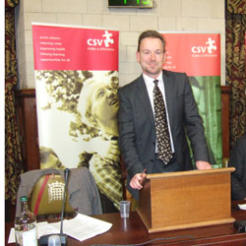Geoff Mulgan, chief executive of Nesta, has said that embedding reciprocity and peer pressure into charitable giving could unlock “latent generosity”.
Mulgan, who was speaking last night at CSV’s annual Edith Khan memorial lecture at the Houses of Parliament, said that it was a part of human nature, that “if you receive, you want to give”.
“Elite schools do very well in asking for donations,” he said. “As do elite universities. But very little of this happens in state schools and colleges. Hospitals do great things for people but don’t ask anything in return.
“There is a legitimate view that having paid your taxes you should just receive your public service without any extra being asked,” he added. “But a huge amount of latent generosity just goes to waste and, paradoxically, people feel worse as a result, because if there is one strong finding from research on happiness it is that giving something, thanking, makes us feel better.”
Mulgan also said visibility could raise charitable giving: “We certainly know that people behave very differently when they’re visible. It tends to raise standards, rein in abusive behaviours and make us more reciprocal,” he said.
“Charitable giving for example is higher in poor communities than among the rich in part because it’s usually more visible – as well as being more reciprocal.”
Mulgan continued that a new trend was happening among the very rich, which involved a sort of “peer pressure” to give more:
“In the US, Warren Buffet and Bill Gates have pledged to give away half of their wealth before they die, and they have encouraged others to sign up to this.
“In the UK, Legacy 10 – a pledge to give 10 per cent of wealth to charity has launched this week. It has the potential to unlock this concentration of wealth in the top 1 per cent.”
However, an audience member during question time argued that the “jury was out” on whether this would encourage people to give more, as many people preferred to keep their giving private.
“There is a pattern that the poor give more because there is a visibility of giving,” Mulgan said in response. “With the very rich visibility is likely to lead to behaviour change. It would have more effect than tax incentives which government tends to give people.”









